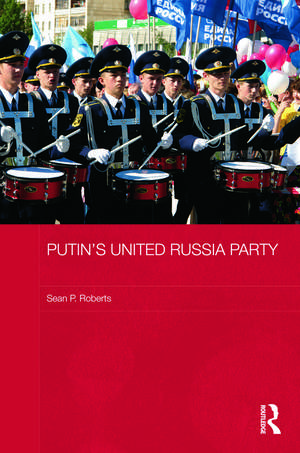Putin's United Russia Party: BASEES/Routledge Series on Russian and East European Studies
Autor S. P. Robertsen Limba Engleză Hardback – 5 dec 2011
The book creates a model to understand the role of political parties in electorally-based political systems and shows how United Russia conforms to this model, and importantly, how the party also has unique features that affect its place in the political system. The book goes on to argue that United Russia represents a ‘virtual’ party hegemony, an outcome of political changes occurring elsewhere, and so a reversal of the typical relationship between parties and power found in comparative literature. This has potentially far reaching implications for our understanding of party dominance in the twenty-first century and also the sources of regime stability and instability.
Din seria BASEES/Routledge Series on Russian and East European Studies
-
 Preț: 309.89 lei
Preț: 309.89 lei -
 Preț: 737.40 lei
Preț: 737.40 lei -
 Preț: 341.55 lei
Preț: 341.55 lei -
 Preț: 297.39 lei
Preț: 297.39 lei -
 Preț: 228.19 lei
Preț: 228.19 lei -
 Preț: 310.85 lei
Preț: 310.85 lei -
 Preț: 311.22 lei
Preț: 311.22 lei -
 Preț: 310.22 lei
Preț: 310.22 lei -
 Preț: 326.49 lei
Preț: 326.49 lei -
 Preț: 641.88 lei
Preț: 641.88 lei - 8%
 Preț: 382.69 lei
Preț: 382.69 lei -
 Preț: 199.46 lei
Preț: 199.46 lei - 9%
 Preț: 1039.42 lei
Preț: 1039.42 lei -
 Preț: 398.18 lei
Preț: 398.18 lei - 18%
 Preț: 1271.75 lei
Preț: 1271.75 lei - 22%
 Preț: 298.10 lei
Preț: 298.10 lei - 18%
 Preț: 1059.84 lei
Preț: 1059.84 lei - 18%
 Preț: 1057.05 lei
Preț: 1057.05 lei - 18%
 Preț: 1062.26 lei
Preț: 1062.26 lei - 18%
 Preț: 1055.51 lei
Preț: 1055.51 lei - 18%
 Preț: 1057.75 lei
Preț: 1057.75 lei - 18%
 Preț: 1059.84 lei
Preț: 1059.84 lei - 25%
 Preț: 823.63 lei
Preț: 823.63 lei -
 Preț: 490.25 lei
Preț: 490.25 lei - 18%
 Preț: 1005.39 lei
Preț: 1005.39 lei - 18%
 Preț: 1000.27 lei
Preț: 1000.27 lei - 8%
 Preț: 383.73 lei
Preț: 383.73 lei - 18%
 Preț: 1059.84 lei
Preț: 1059.84 lei - 18%
 Preț: 1009.21 lei
Preț: 1009.21 lei - 18%
 Preț: 1059.84 lei
Preț: 1059.84 lei - 18%
 Preț: 1167.36 lei
Preț: 1167.36 lei - 25%
 Preț: 771.71 lei
Preț: 771.71 lei - 18%
 Preț: 1059.84 lei
Preț: 1059.84 lei - 18%
 Preț: 1004.20 lei
Preț: 1004.20 lei - 18%
 Preț: 1053.92 lei
Preț: 1053.92 lei - 25%
 Preț: 515.72 lei
Preț: 515.72 lei - 18%
 Preț: 709.01 lei
Preț: 709.01 lei - 25%
 Preț: 823.08 lei
Preț: 823.08 lei - 18%
 Preț: 1112.90 lei
Preț: 1112.90 lei - 18%
 Preț: 1057.75 lei
Preț: 1057.75 lei - 18%
 Preț: 1065.75 lei
Preț: 1065.75 lei - 18%
 Preț: 1055.51 lei
Preț: 1055.51 lei - 26%
 Preț: 850.73 lei
Preț: 850.73 lei - 18%
 Preț: 1059.84 lei
Preț: 1059.84 lei - 25%
 Preț: 825.06 lei
Preț: 825.06 lei - 18%
 Preț: 734.50 lei
Preț: 734.50 lei
Preț: 822.54 lei
Preț vechi: 1104.33 lei
-26% Nou
Puncte Express: 1234
Preț estimativ în valută:
157.40€ • 164.54$ • 133.01£
157.40€ • 164.54$ • 133.01£
Carte tipărită la comandă
Livrare economică 07-21 martie
Preluare comenzi: 021 569.72.76
Specificații
ISBN-13: 9780415669023
ISBN-10: 0415669022
Pagini: 240
Ilustrații: 13 b/w images, 7 tables and 13 line drawings
Dimensiuni: 156 x 234 x 19 mm
Greutate: 0.6 kg
Ediția:1
Editura: Taylor & Francis
Colecția Routledge
Seria BASEES/Routledge Series on Russian and East European Studies
Locul publicării:Oxford, United Kingdom
ISBN-10: 0415669022
Pagini: 240
Ilustrații: 13 b/w images, 7 tables and 13 line drawings
Dimensiuni: 156 x 234 x 19 mm
Greutate: 0.6 kg
Ediția:1
Editura: Taylor & Francis
Colecția Routledge
Seria BASEES/Routledge Series on Russian and East European Studies
Locul publicării:Oxford, United Kingdom
Public țintă
PostgraduateCuprins
1. Ruling parties and dominant-power politics: the theoretical framework 2. Parties of power: the origins of United Russia 3. Managing elections: delivering the right result 4. Governance in the post-Yeltsin period: the locale of power 5. The Politics of stability: United Russia as an intergrative force 6. Parties and regime outcomes: the post-Yeltsin ruling party
Descriere
From its inception in 2001, the United Russia Party has rapidly developed into a hugely successful, organisationally-complex political party and key component of power. This book provides a much needed analysis on United Russia by exploring the role of the party in the Russian political system, from 2000 to 2010. It engages with party-building in Russia in the entire post-Soviet and late Soviet period in order to understand the essential origins of United Russia, as well as examining the party’s relationship with the wider political tendencies evident in Russia in the same period.
The book creates a model to understand the role of political parties in electorally-based political systems and shows how United Russia conforms to this model, and importantly, how the party also has unique features that affect its place in the political system. The book goes on to argue that United Russia represents a ‘virtual’ party hegemony, an outcome of political changes occurring elsewhere, and so a reversal of the typical relationship between parties and power found in comparative literature. This has potentially far reaching implications for our understanding of party dominance in the twenty-first century and also the sources of regime stability and instability.
The book creates a model to understand the role of political parties in electorally-based political systems and shows how United Russia conforms to this model, and importantly, how the party also has unique features that affect its place in the political system. The book goes on to argue that United Russia represents a ‘virtual’ party hegemony, an outcome of political changes occurring elsewhere, and so a reversal of the typical relationship between parties and power found in comparative literature. This has potentially far reaching implications for our understanding of party dominance in the twenty-first century and also the sources of regime stability and instability.
